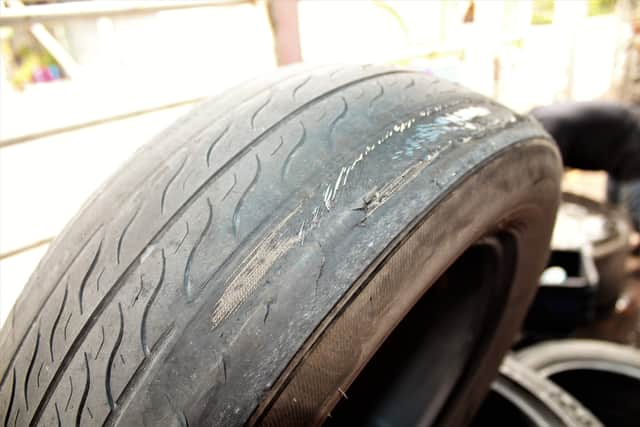MOT checks: warning of surge in unsafe cars on UK roads as cost of living crisis sees drivers dodge tests
and live on Freeview channel 276
March is set to see a record number of potentially dangerous cars on the roads as drivers struggle with the cost of motoring, according to a new report.
Halfords is warning that up to 400,000 drivers could be set to avoid their car’s MOT as they look to save money, potentially leaving more unsafe vehicles in use.
Advertisement
Hide AdAdvertisement
Hide AdThe motoring service and retail specialist found that one in six motorists feared they would not be able to afford the annual roadworthiness test this month. However, 71% said they would continue to use their vehicle without an MOT, running the risk of a serious fine.
With around 3.3 million cars due to be tested this month, that could leave as many as 406,000 cars on the road with an expired MOT. DVSA figures show the current MOT failure rate stands at 28.5%, meaning up to an additional 115,710 unsafe cars could still be in use.
The majority of drivers blamed the cost of living crisis for their intention to keep using their car without an MOT, with 66% saying they have to prioritise spending on other household expenses. The poll found that drivers were far less likely to avoid taxing or insuring their vehicles, with just 16% of those who plan to avoid their MOT say they will also avoid paying car tax and insurance.
Half said this was because they thought they were more likely to be caught out if their car was uninsured or untaxed and around a third believed the punishment for driving without an MOT was less severe. Driving without an MOT carries a £1,000 fine, but using a vehicle deemed “dangerous” by an MOT test without rectifying the issues can lead to a fine of up to £2,500 as well as a driving ban and three penalty points.
Advertisement
Hide AdAdvertisement
Hide AdHalfords CEO Graham Stapleton said: “The data shows that March is set to be the worst month we have ever seen when it comes to cars on our roads without an MOT. MOTs are vital, annual safety checks that take place on vehicles that are three years old or more. It’s not about ticking boxes – MOTs check things such as if there is enough tread on tyres, or if brakes are working correctly.
“Official data shows that 28.5% of vehicles fail their MOT. This means that around three in ten of the vehicles owned by people planning to skip their MOT are likely to be unroadworthy - possibly more as those who avoid an MOT could be more likely to take less care of their vehicle in general and replace things such as tyres in good time.


“The fact that so many could be driving their kids to school in vehicles without an MOT is a genuine worry. The bottom line is that it is not worth the risk – not just of a fine and points, but of endangering yourself or others.”
Antony Kildare, CEO of IAM RoadSmart, the UK’s leading road safety charity said: “Households up and down the country are being forced to cut back on everyday outgoings to balance the books, but with the latest figures showing 27,450 people were killed or seriously injured on UK roads, it’s extremely worrying to learn that such a large proportion of motorists are opting not to have their annual MOT.
Advertisement
Hide AdAdvertisement
Hide Ad“We urge motorists to take their vehicle for its annual MOT, but we also encourage regular vehicle checks to help prevent MOT fails. These include ensuring engine oil is topped up, checking tyres daily, practising good driving habits and paying attention to warning lights and strange noises. It’s not worth drivers taking risks, for themselves or other road users.”
Comment Guidelines
National World encourages reader discussion on our stories. User feedback, insights and back-and-forth exchanges add a rich layer of context to reporting. Please review our Community Guidelines before commenting.
